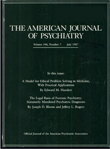A program for late twentieth-century psychiatry
Abstract
The author argues against conceptions of the current state of psychiatry that either accept eclecticism as natural or treat some specific biological or psychodynamic model as the true core of psychiatry. He presents a unified program for biological and psychodynamic explanation and therapy. The biological aspect of this agenda supports a unitary view of mental illness but dissociates this view from reductionist premises. The psychological aspect treats particular psychodynamic theories, including Freud's, as special cases of a more basic account of affect and imagination. The program has unequivocal diagnostic, explanatory, and therapeutic implications as well as a larger social meaning.
Access content
To read the fulltext, please use one of the options below to sign in or purchase access.- Personal login
- Institutional Login
- Sign in via OpenAthens
- Register for access
-
Please login/register if you wish to pair your device and check access availability.
Not a subscriber?
PsychiatryOnline subscription options offer access to the DSM-5 library, books, journals, CME, and patient resources. This all-in-one virtual library provides psychiatrists and mental health professionals with key resources for diagnosis, treatment, research, and professional development.
Need more help? PsychiatryOnline Customer Service may be reached by emailing [email protected] or by calling 800-368-5777 (in the U.S.) or 703-907-7322 (outside the U.S.).



